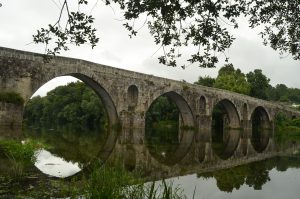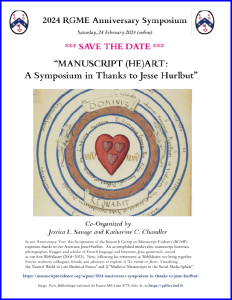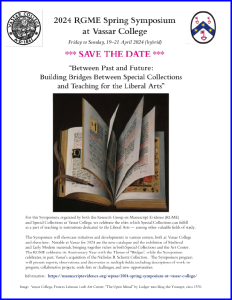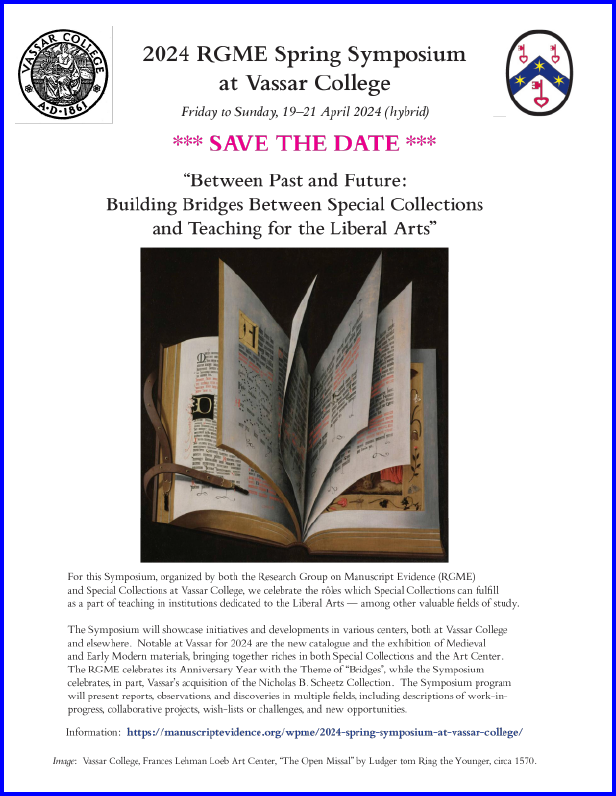2025 RGME Visit to Vassar College
March 2, 2025 in Uncategorized
2025 RGME Visit
to Vassar College
Medieval & Renaissance
Manuscripts & Cuttings
at
The Archives & Special Collections Library
and
The Frances Lehman Loeb Art Center
Sunday 4 May 2025
4:00 – 6:00 pm
and
Monday 5 May 2025
11:00 am – 4:30 pm
In person and Online by Zoom

Approach to Main Library, Vassar College. Photograph by Mildred Budny.
[Posted on 1 March 2025, with updates]
Inspired by the 2024 RGME Spring Symposium at Vassar College, we return in May for a visit to its collections.
This time, we will see some of its Medieval & Renaissance manuscripts, fragments, and cuttings. These manuscript materials at Vassar are held in the
We will visit both, with lunch in between. An RGME Roundtable discussion will follow the afternoon visit.
In addition, at each location, undergraduate students or a new member of the faculty for the Art Department will speak about their work on some of the manuscript materials. They will present new discoveries, with the chance to see the original materials themselves.
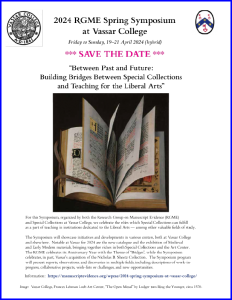
Save-the-Date Poster for 2024 RGME Spring Symposium at Vassar College. Poster set in RGME Bembino.
Prequel:
Our 2024 Spring Symposium
Some of these materials were considered in presentations at the 2024 Spring Symposium; some were displayed at the special exhibition, where we could see them on view. See:
- Books of the Middle Ages and and Renaissance (April 19–June 23, 2024)
At the first Reception of the Symposium, Vassar undergraduate students described their work on several of them to prepare for this exhibition.
Coinciding with the Symposium was the publication of the new catalogue of these materials.
- Catalogue of Medieval & Renaissance Manuscripts at Vassar College, Including the Nicholas B. Scheetz Collection and the Frances Lehman Loeb Art Center, compiled by Peter Kidd (Vassar College, 2024)
ISBN 9798218363758
2025 RGME Visit to Vassar
Our 2025 RGME In-Person/Hybrid Visit will take place on Monday 5 May. There will be a preliminary session on Sunday 4 May.
We invite you to attend either:
- in person (places are limited due to space) or
- online.
The RGME will provide online and interactive access by Zoom, to allow a wider audience to join us for an interactive Zoom Meeting.
For Registration information, see below.
A Centerpoint for the RGME’s 2025 Activities
The plan for this visit connects with the RGME theme of collectors and collecting for our events this year, and also for our work on manuscript fragments.
For the various events, held online and in various locations as in-person/hybrid events, see:
Spring (Part 1 of 2)
“Makers, Producers, and Collectors of Books:
From Author/Artist/Artisan to Library” (28–30 March online)
Autumn (Part 2 of 2)
“Readers, Fakers, and Re-Creators of Books:
From Page to Marketplace and Beyond” (17–19 October online or hybrid)
- 2025 Autumn Colloquium at the University of Waterloo. (21–23 November hybrid)
“Break-Up Books and Make-Up Books:
Encountering and Reconstructing the Legacy
of Otto F. Ege and Other Biblioclasts”
Plan/Program
Overview
Sunday 4 May
- The afternoon before the full day’s visit, a preliminary session (hybrid) at 4:00–5:30 pm EDT offers the chance to gather at the Murphy Room of the Art Library for Martha Frish’s presentation on “The Symbols of Vassar Architecture”. This presentation gives an update from her Post-Symposium Presentation last year. (See 2024 Spring Symposium.)
- For the location of the Murphy Room, see Maps and Call Numbers, Art Library
Monday 5 May
- In the morning we will visit the Frances Lehman Loeb Art Center (on its closed day), to see some of its manuscripts and manuscript cuttings.
- Lunch will be held in its Sculpture Garden (or inside in case of inclement weather).
- After lunch, we will visit the Frederick Ferris Thompson Memorial Library (Main Library), to see some of its manuscript materials held in the Archives & Special Collections Library.
- Then we will move to the Seminar Room in Special Collections to hold a Roundtable discussion. We may continue conversation about the materials, compare notes, and reflect on the day.
- For drinks and dinner, we would go to a local restaurant, for repasts at our own expense.
Rachel Wise, Professor of Art, will speak about her study of one of the most important manuscripts in its collection.
Ronald Patkus will speak about provenance for materials in both the Art Center and Special Collections.
Two Vassar students will speak about the art of materials in Special Collections:
Benjamin Garrity (Class of ’27) will speak about the Loeb Book of Hours.
Tara Peterson (Class of ’25) will speak about the Spanish Forger.
The showcased items in the two collections comprise: an album of collected initials; selected Books of Hours; and a leaf illustrated in medieval style by the prolific and renowned Spanish Forger. On hand, by request, at the session on Special Collections, might be its leaf from the Saint Albans Bible, a dismembered manuscript being researched by the RGME because of a current loan. (See below.)
Program
1. Sunday 4 May
Afternoon: 4:00–5:30 pm EDT (GMT-4)
This special presentation will take place in person in the
To register for this portion of the Visit, please use these links:

“The Quad as Exterior Room”. Photograph of the Residential Quad by Martha Frish (2016).
2. Monday 5 May
Morning
10:30–11:30
Art Center, Seminar Room
We would meet by 10:30 am in the Entrance Lobby of the Frances Lehman Loeb Art Center . Note that the Art Center is otherwise closed on Mondays.
Our visit allows us to see some of its manuscripts and manuscript cuttings. They include materials not normally on show.
Both John P. Murphy and Ronald D. Patkus will speak about the materials. Rachel Wise, Professor of Art, will speak about her study of one of the most important manuscripts in the collection.
They will demonstrate 1) an album of cuttings of choice portions from manuscripts (such as illuminated initials) and 2) a Book of Hours. These monuments are:
Other contents include drawings of architectural features, copies of paintings, and copies of manuscript illuminations and marginalia from medieval manuscripts now in Oxford, London, and Salisbury Cathedral. Some of those manuscripts have been the subjects of RGME seminars.
See also Object: Manuscript
2. Book of Hours, 15th century (Loeb 1994.2.2)
Book of Hours of Jean Olivier, Bishop of Angers (bishop from 1532–1540), for the Use of Rome, in Latin and French. France: Paris? Circa 1510–1540 or 1510–1520.
Catalogue, pp. 266–269 (with plate on p. 267)
See also The Melun-Epinoy Hours
Rachel Wise, Professor of Art, will speak about the art of the manuscript, Ronald Patkus about provenance, and then we will have discussion.

The Melun-Épinoy Hours, opened to Annunciation scene. c. 1501–1520. Image: Frances Lehman Loeb Art Center, Vassar College
12:00–1:00 pm
Lunch
Lunch will take place in the outdoor Sculpture Garden. In case of inclement weather, we will go inside.
Afternoon
After lunch we will move to the Frederick Ferris Thompson Memorial Library (Main Library).
The first afternoon session, showcasing materials in Special Collections, will take place in the Class of 1951 Reading Room.
The second afternoon session, featuring a RGME Roundtable discussion, will take place in the Seminar Room of Special Collections (which closes at 4:30 pm).
1:00–2:00 pm
Spotlight on Special Collections
Class of 1951 Reading Room
Selected materials from Special Collections will be available for examination and discussion.
Ronald D. Patkus will speak about the materials. Students of both Ronald and Rachel Wise will speak about their work 1) on a leaf by The Spanish Forger, a notorious and prolific producer active in the late-nineteenth and/or early twentieth century, probably in Paris; and 2) on the Loeb Book of Hours.
Painted image on the other. The image depicts an encounter outside a walled city between a solder and a lady, each with retinue. France, late 19th or early 20th century.
Catalogue, pp. 107–109 (with plate on p. 108)
Catalogue, pp. 21–14 (with plate on p. 13)
2:00–2:30 pm
Break
3:30–4:00 pm
RGME Roundtable
“Looking at Manuscripts and Collections”

Collection of Jennah Farrell, Vulgate Bible Leaf, Recto. Photography by Mildred Budny.
This occasion offers the opportunity to share reflections about the materials demonstrated on our visit to both the Art Center and Main Library. Several of us might describe our research on some of them or relatives to them. We would consider their bearing on subjects which the RGME considers this year in its variety of events and projects.
1. Manuscript Fragments:
Challenges and Opportunities for Research
For example, recently the RGME has been examining the Farrell Leaf and the Weber Leaf from the Saint Albans Bible, dismembered directly after sale in 1964 and widely distributed thereafter frequently through sale rooms. The original manuscript, a single-volume Latin Vulgate Bible, was produced in France, probably Paris, circa 1330-1340. See our Workshops on “The Evidence of Manuscripts, Etc.”
A leaf from the same book belongs to Vassar College. It is part of the Nicholas B. Scheetz Collection of Medieval & Renaissance Manuscripts (Scheetz MS 27). About this leaf, see the entry in the recent catalogue:
- Catalogue of Medieval & Renaissance Manuscripts at Vassar College, compiled by Peter Kidd (Vassar College, 2024), p. 217.
It could be useful to compare notes about these relatives which formerly stood within the same covers of a single-volume Latin Vulgate Bible. Whereas many leaves known from the original manuscript in a variety of collections belong to the Old and New Testament portions of the Bible, the Vassar leaf from the Scheetz Collection belongs to part of the textual apparatus of the Interpretation of Hebrew Names in glossary form, arranged alphabetically, and specifically from within the section for terms beginning with the letter B.

Collection of Richard Weber, Leaf from the Saint Albans Bible, Recto: Top Right. Photograph by Richard Weber.
2. Provenance: A Perennial Quest
Other subjects under consideration this year by the RGME fall into the sphere of the Visit to Vassar’s collections. Among them are issues of provenance for the objects, whether known, detectable, or unknown. Such issues can form an important part of the history of their transmission and, perhaps, of legitimacy, as in the case of forgeries.
Our roundtable might mention various points of contact between the visit and our other events for this year, which have led to the selection of objects to examine. The Vassar Visit stands poised between them:
- our Spring and Autumn Symposia which explore aspects of “Agents and Agencies” in the realms of books
2025 Spring and Autumn Symposia - our sessions on “Manuscripts at Worlds of Knowledge” at the 2025 International Medieval Congress at Leeds
2025 International Medieval Congress at Leeds: RGME Program - our Autumn Colloquium on “Break-Up Books and Make-Up Books: Encountering and Reconstructing the Legacy of Otto F. Ege and Other Biblioclasts”
2025 RGME Autumn Colloquium at the University of Waterloo
The design of the Visit, selected by Ronald Patkus and John Murphey, responds thoughtfully and expertly to these shared interests for collective exploration in 2025.
Reception
A Reception will close the day’s visit.
Celebratory Reception
5:00–7:30 pm EDT
Class of 1951 Reading Room
We celebrate the visit, the sharing of expertise and experiences in studying the original sources at Vassar, and the generosity of the curators, donors, contributors, organizers, hosts, and student interns. We invite you to join us.
Dinner
Afterward, we would go to a local restaurant for drinks and/or dinner (at our own expense). There, we could continue conversation in the company of people interested in books, their care, their study, their ability to teach, their stories, and their delight.
Information for Visiting Vassar
For information on travel, directions, campus maps, accommodation, dining, and other features in the area, see:
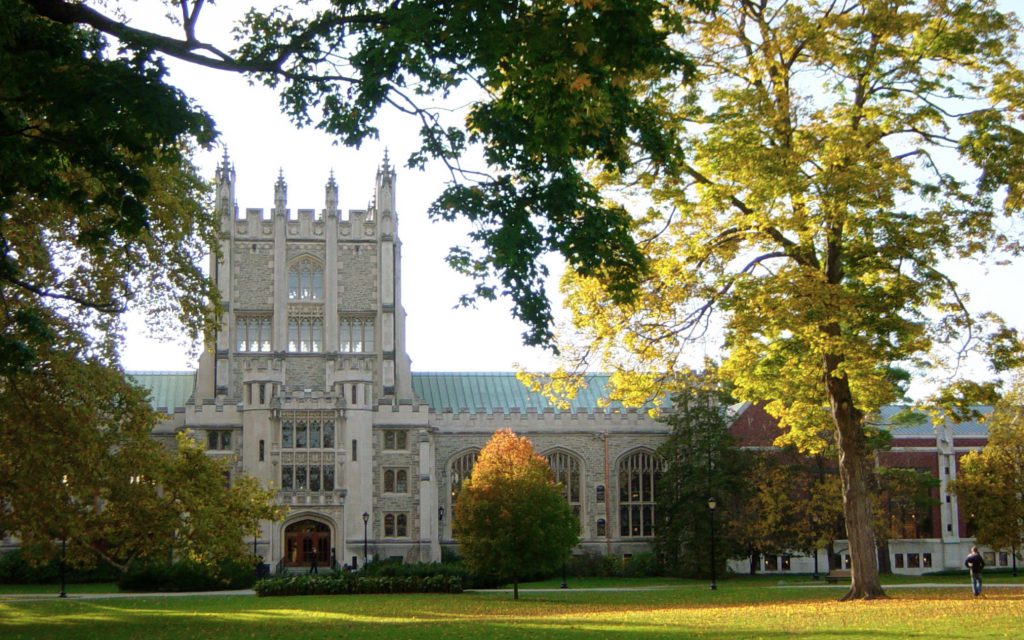
A photo of the Thompson Library at Vassar College in Poughkeepsie, New York, taken by me [Noteremote] on November 2, 2007. via Wikimedia Commons Creative Commons Attribution-Share Alike 3.0 Unported, via https://en.wikipedia.org/wiki/File:Thompson_Library_(Vassar_College).jpg.
Registration
You can register for the RGME Vassar Visit through the RGME Eventbrite Portal. See:
There you will be able to register to attend either in person or online.
We encourage you to make a Voluntary Donation when you register. It will help to support our small nonprofit educational organization powered principally by volunteers.
1. Sunday 4 May 2025
2. Monday 5 May 2025
To register for the Visit to the Art Center and the Main Library on Monday 5 May, please use these links:
1) In-Person Visit
For in-person attendance, space is limited. In registering for in-person attendance, for the catering you will be given the opportunity to indicate any dietary requirements.
2025 RGME Visit to Vassar College IN PERSON
2) Online Visit
For online attendance, once you register, the Zoom Link will be sent to you shortly before the event.
2025 RGME Visit to Vassar College ONLINE
Thank you for your interest and support. We look forward to welcoming you.
*****
Thanks
For arranging this visit, we thank:
- Ronald D. Patkus, Head of Special Collections and College Historian, Adjunct Associate Professor of History on the Frederick Weyerhaeuser Chair
- John P. Murphy, Philip and Lynn Straus Curator of Prints and Drawings at the Frances Lehman Loeb Art Center
We thank the speakers for their contributions to share their work on manuscript materials at Vassar College: Rachel Wise, Ronald Patkus, John Murphy, and Vassar students Ben Gerrity and Tara Peterson. Thanks go to Thomas E. Hill, Art Librarian, for arranging the visit to the Murphy Room, to Francine Brown of the Art Center, and Amanda Burdine. Thanks go to the 2025 RGME Visit Student Interns for help behind the scenes: Betsy Subiros (Class of 2025), Anna Gilsdorf, and Rachel Stanger (Class of 2027).
We give thanks to the staff and others at Vassar College for this visit.
We look forward to the visit. You are invited to join, whether in person or virtually.
*****
Questions or Suggestions?
Please let us know.
- Leave your comments or questions below
- Contact Us
Visit our Social Media:
-
- our href=”https://www.facebook.com/Research-Group-on-Manuscript-Evidence-259443617456668/” target=”_blank” rel=”noopener”>FaceBook Page
- our href=”https://www.facebook.com/groups/rgmemss” target=”_blank” rel=”noopener”>Facebook Group
- our X/Twitter Feed (@rgme_mss)
- our Bluesky nest (@rgmesocial.bluesky.social)
- our href=”https://www.instagram.com/rgme94/” target=”_blank” rel=”noopener”>Instagram Page
- our LinkedIn Group
Join the Friends of the RGME
Please make a Donation in Funds or in Kind for our nonprofit educational corporation powered principally by volunteers. Your donations and contributions are welcome, and can go a long way. They may be tax-deductible to the fullest extent provided by the law.
We look forward to seeing you and welcoming you to our events.
*****


















